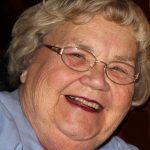By Betty Mills
For a young woman the question, “What do you want to be when you grow up?” had always a limited list back in those now long ago days when I was of an age to be asked that question.
“Teacher, nurse, secretary,” were the usual responses with an occasional newly added “social work” showing up. Underlying those limited possibilities was the ever present “wife and mother.”
Only my brother qualified for “doctor, lawyer, merchant chief” as the old rhyme put it, and never added as a potential lifework were those subsidiary occupations, “husband and father.” Just to complete the circle of limitations, I’m sure my mother never taught him to cook or iron his shirts.
That view of a woman’s life did not change when I entered the university, not with my friends, professors, or the vocational guidance bureau where I once squandered three days of my confused young life. The question I most remember was the counselor’s query, “Would you like to be an opera singer?” Since I was notable for not being able to carry a tune, I realized on that instant I was back at the starting gate. So I married the new young lawyer in town and devoutly wished I’d signed up for home economics when I’d had the chance.
In addition to our society squandering a lot of human potential, those often wistfully referred to as “the good old days” contained hidden perils for women who had no marketable professions. I remember one winter night watching for my husband’s late return from an out of town business trip when the paralyzing possibility occurred to me: what if he was killed on that ice covered highway? How could I support our family? Put four kids through college? Pay the mortgage, or buy tennis shoes?
There is much help in our current life that allows women to have careers and clean sheets, diapers in the garbage, cars remotely warmed if they are running late at the office, a paycheck to add to the family’s well-being, and a man in the kitchen no longer demoted for “doing women’s work.”
Given my perilous professional past as chief cook and bottle washer, I revel in the sight of women pilots, physicians, truck drivers, scientists, mathematicians, chemists, politicians, executives, engineers—an ever lengthening list of professional possibilities for women. My own three daughters are respectively a lawyer, an accountant, and an occupational therapist. The occupational therapist opted to revert to housewife and mother and now tells me unless she went back for an update and a master’s degree, she would not be viable in the job market.
The moral of my story, my practical advice to all young women, the in-case-of life insurance, is to find a profession that will support them personally and financially and keep it current. There is more to it than that, of course. To limit life’s possibilities for women is to chain them to a no longer useful view of women. In addition, there’s the talent that goes unfulfilled, the once lively ambitions squelched by questionable choices, and the loss to society of those talents.
I was always put off by the question in surveys and from new acquaintances, “What is your occupation?” That became the conversational equivalent of running into a brick wall. Try it sometime. You’re seated on an airline with a well-dressed businessman in the other seat, and he inquires into your lifework.
“I’m a housewife,” you reply, and he promptly remembers the report he has to read before his upcoming meeting. I was always tempted to say, “I’m a call girl—can I be of any service?” except at such moments of temptation my mother is back whispering in my ear.
Then I co-authored a book and began writing a weekly political column, and could reply, “I’m a writer.” Even that sometimes failed to bridge the career gap which was women’s fate in my day, typified by one young man’s response, “On household hints?” His disbelief was obvious when I replied, “No, politics.”
My chief regret in life is that I missed the exciting possibilities now available to modern American women.
Betty graduated with honors from Mary College in 1967 with a degree in social work. Her career has included motherhood and leadership. Betty served on many local boards and councils.

